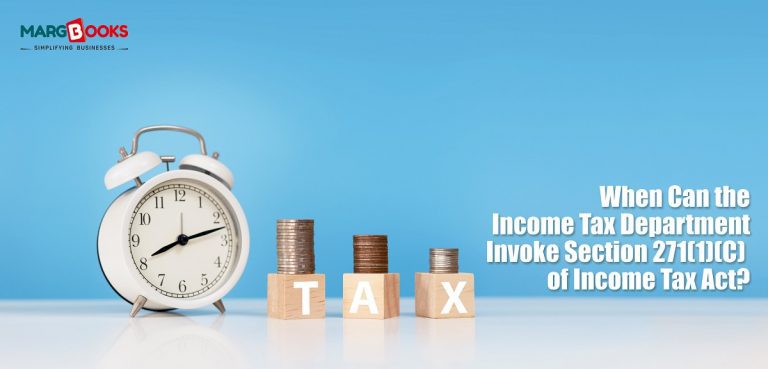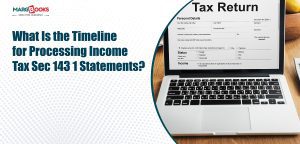Income tax compliance is a critical responsibility for businesses and individuals in India. With a complex tax structure, it’s not uncommon for taxpayers to face scrutiny from the Income Tax Department. One of the sections that can have significant implications for taxpayers who are found to have underreported or inaccurately reported their income is Section 271(1)(c) of the Income Tax Act.
This provision gives the authorities the power to levy penalties in cases of concealment of income or inaccurate filing. In this blog post, we will explore when the Income Tax Department can invoke this section and what it means for taxpayers, with a focus on compliance, reporting, and record-keeping strategies, inventory management software, and cloud-based GST software.
Understanding Section 271(1)(c) of the Income Tax Act
Before we delve into when Section 271(1)(c) can be invoked, it’s important to understand what the section entails. Section 271(1)(c) deals with penalties for the concealment of income or inaccurate filing of tax returns. If the Income Tax Department finds that a taxpayer has either concealed income or provided incorrect information in their tax return, they may impose a penalty under this section.
The penalty can range from 100% to 300% of the tax evaded or not paid due to such concealment or misreporting. The intention behind this provision is to discourage taxpayers from making false claims and to ensure fair tax practices across the country.
Key Provisions Under Section 271(1)(c)
- Concealment of Income: If a taxpayer is found to have concealed any part of their income intentionally, the Income Tax Department can invoke this section.
- Furnishing Inaccurate Information: Similarly, if the taxpayer has furnished inaccurate details, such as overstating deductions or claiming expenses not genuinely incurred, they could be penalized under Section 271(1)(c).
- Tax Evasion: In cases where tax evasion is proven through these actions, the penalty can be levied.
- Penalty Range: The penalty imposed can be 100% to 300% of the tax amount that is sought to be evaded.
When Can Section 271(1)(c) Be Invoked?
Section 271(1)(c) is not invoked arbitrarily. The Income Tax Department has strict guidelines that determine when this section can be applied. Here are the main scenarios under which the Income Tax Department can invoke this provision:
1. Underreporting or Concealment of Income
If a taxpayer deliberately hides income to reduce their tax liability, Section 271(1)(c) can be invoked. Underreporting of income can be in the form of failing to declare interest income, rental income, or earnings from a side business. Concealing income might also include not disclosing profits from investments or hiding gains in the form of capital appreciation.
Example: A taxpayer underreports the sale proceeds from the sale of property or shares to evade taxes.
2. Incorrect Reporting of Expenses or Deductions
Another common reason for the invocation of this section is the deliberate misreporting of expenses or deductions. For instance, a taxpayer might overstate the deductions under Section 80C or falsely claim deductions on expenses that have not been incurred.
Example: A business claims expenses for a purchase that is not supported by any valid receipts or invoices.
3. Failure to Disclose All Sources of Income
Taxpayers are required to disclose all their sources of income. If a taxpayer fails to report income from foreign investments, freelance work, or other income-generating activities, they can be penalized under Section 271(1)(c).
4. Discrepancies Between Tax Returns and Records
If the Income Tax Department finds that the information provided in a taxpayer’s return does not match their financial records or books of accounts, it could lead to the application of Section 271(1)(c).
Example: Discrepancies between sales declared in the tax return and sales records maintained in the inventory management software.
Impact of Technology on Compliance and Penalties
With the advancement of technology and digitization of tax processes in India, businesses now have access to tools, inventory management software, and cloud-based GST software to ensure accurate record-keeping and tax filing. These tools can help minimize errors and avoid the penalties associated with non-compliance.
Benefits of Inventory Management Software
Inventory management is a key aspect of business operations, especially for manufacturing and retail businesses. Failing to maintain accurate records can lead to discrepancies during tax audits. By using inventory management software, businesses can keep track of their stock and sales in real time, ensuring that all income from sales is properly reported. Moreover, the software helps in maintaining records of purchase and sale invoices, which can serve as important proof in case of any tax scrutiny.
Benefits of Cloud-Based GST Software
The introduction of the Goods and Services Tax (GST) has added another layer of complexity to taxation in India. Businesses need to ensure that their GST filings are accurate and up to date. Using cloud-based GST software helps businesses track their GST transactions, file returns seamlessly, and stay compliant with the latest tax laws. These software tools can sync with your accounting systems, ensuring that the data used in GST filings is accurate and up-to-date, thus reducing the chances of penalties under Section 271(1)(c).
Steps to Avoid Penalties Under Section 271(1)(c)
To avoid the penalties associated with Section 271(1)(c), taxpayers must adopt a proactive approach to tax compliance. Below are some steps to help you stay on the right side of the law:
1. Maintain Accurate Books of Accounts
One of the primary reasons for penalties under Section 271(1)(c) is incorrect reporting of income and expenses. Keeping detailed and accurate records of all financial transactions is crucial. Tools like inventory management software can help businesses keep track of their stock and sales records accurately.
2. Use Technology for Tax Filing
Adopt software solutions such as cloud-based GST software that help ensure accurate GST filings. Such software can help track every transaction and generate reports that can be used for filing returns, reducing the risk of errors.
3. Report All Sources of Income
Ensure that all your income, whether from salary, business profits, investments, or any other source, is accurately reported in your tax returns.
4. File Your Returns on Time
Timely filing of tax returns is another critical aspect of compliance. Avoid late filing, which can not only lead to interest and penalties but also trigger scrutiny by the Income Tax Department.
5. Consult Tax Professionals
For businesses with complex tax situations or individuals who may be unsure about specific deductions or income sources, it’s advisable to consult with a tax professional. Their expertise can guide you in maintaining accurate records and ensuring compliance with the Income Tax Act.
Conclusion
Section 271(1)(c) of the Income Tax Act serves as a powerful tool for the Income Tax Department to penalize taxpayers who try to evade taxes through underreporting income or providing inaccurate details in their tax returns. By understanding the conditions under which this provision is invoked and adopting best practices, maintaining accurate financial records using inventory management software and cloud-based GST software, taxpayers can minimize the risk of penalties and ensure they remain compliant with the law.
In today’s digital age, leveraging technology for tax compliance has become easier and more effective. Tools like these not only streamline the tax filing process but also help businesses maintain transparency and avoid costly penalties, ensuring that they can focus on growing their operations without the fear of tax-related issues.
For businesses looking to stay ahead of tax compliance, platforms, Margbooks provides an all-in-one solution to manage inventory, GST filings, and accounting, making compliance simpler and more efficient. With the right tools and knowledge, you can avoid the financial strain of penalties and ensure smooth operations.




